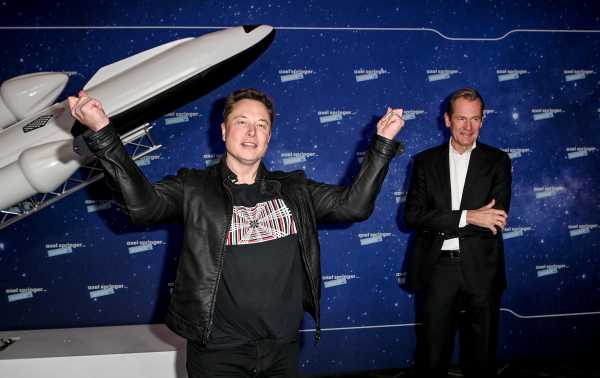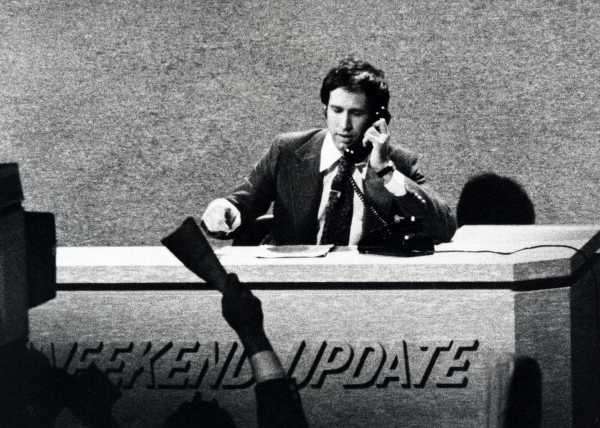
Elon Musk — Tesla CEO, SpaceX man, and the richest person in the world — is hosting Saturday Night Live on Saturday night. As always when it comes to Elon Musk, his immense power and wealth have combined with his seemingly complete lack of self-awareness to create the perfect storm of something to be mad about for a bit. A handful of SNL cast members have expressed their irritation, and the show has reportedly made clear to all cast members that they’re allowed to skip out on Musk’s episode if they like.
Musk isn’t a typical SNL host. The two episodes that will follow Musk’s — the last of SNL’s current season — will be hosted by actors Keegan-Michael Key and Anya Taylor-Joy, two performers whose established skill sets align much more appropriately with SNL’s usual blend of perfectly adequate comedy. Musk, who once hired a bunch of comedy writers to start a ripoff of the Onion, possibly because the Onion made fun of him, only to see this plan never go anywhere, is … not a natural fit for SNL, to put it mildly.
He is also a controversial figure for reasons beyond “he’s probably not that funny,” and I’ll get to those in a second. But first, it must be acknowledged: He’s probably not that funny.
So just why is Musk hosting SNL if he’s sparked such controversy? The answer is right there within the question: Elon Musk is hosting SNL because he’s sparked such controversy.
The long-running sketch show will sometimes drop a controversial figure into its host lineup in hopes of goosing ratings and driving conversation when people write articles like this one. Just a little under six years ago, the show handed over the hosting gig to then-presidential candidate Donald Trump, and look how that turned out! The episode garnered great ratings, and Trump, having been exposed as a subject of ridicule by a popular comedy program that would never accidentally normalize him, was never heard from again.
(No, obviously, Trump became the president of the United States and was pretty bad at the job. SNL spent many of those years presenting the most milquetoast criticism of the president as a hapless buffoon, all while facing frequent grumbling about how it had normalized him via his 2015 guest-hosting gig.)
Related
Saturday Night Live was the emptiest show of 2017
The Trump episode hangs heavily over the Musk controversy, but so do SNL’s recent rating woes. (Especially since the 2020 election, the show has been in a pronounced ratings slide.) So it’s easy to be cynical about Musk’s hosting gig; SNL needs viewers, and controversy drives curiosity from casual audience members, and Musk will be sure to drive controversy, ergo. And SNL’s decision to let cast members who’d rather sit out the episode take the week off easily folds into this narrative. After all, what better way to get a certain subset of viewers all het up than being able to call some of the show’s cast members snowflakes or whatever?
But I would argue we’re not being cynical enough. Every single SNL controversy is driven by the same basic impulse to ascribe the show with a power it simply does not hold. The latest SNL controversy has almost nothing to do with Elon Musk and everything to do with the Baby Boomer gerontocracy.
And yes, I’m going to show my work.
A brief history of Elon Musk being a humongous jerk

A complete history of all of the awful things Elon Musk has done is beyond the purview of this article, so I asked Vox writer Emily Stewart, who has covered Musk extensively, to provide me with a greatest hits compendium of Musk at his worst.* She gave me the rundown, which I’ve summarized below.
*Over the last three years. We’re not gonna go back before 2018, because there’s just too much, and 2018 is when Musk decided he should assist with the Thai cave rescue, which I couldn’t not include.
To wit:
- In March, the National Labor Relations Board ordered Tesla to make Musk delete a tweet seen as threatening to union organizers within the company.
- Elon Musk is awful about Covid-19, take one: Musk spent much of the first half of March 2020 downplaying the threat of Covid-19 to his 32 million followers on Twitter. (Later, he promised to build ventilators for California hospitals, although the equipment he sent didn’t prove to be all that helpful in ventilating Covid-19 patients.)
- Elon Musk is awful about Covid-19, take two: Musk continued to spread misinformation about Covid-19 throughout the rest of 2020, again to his 32 million Twitter followers. Later, he actually contracted the virus and had to miss a SpaceX launch.
- Elon Musk is awful about Covid-19, take three: Musk rushed to reopen a Tesla plant in early 2021, leading to hundreds of new coronavirus cases.
- Elon Musk is awful about Covid-19, take four: Musk spread unfounded concern and confusion about Covid-19 vaccines.
- Musk frequently makes tweets that bounce Tesla’s stock price all over the place — and who can say why, in the end?
- He’s a big booster of various cryptocurrencies, most recently dogecoin, and cryptocurrencies are not the best friends of the planet.
- He’s fond of grand engineering projects that thus far haven’t borne fruit. He wants to go to Mars, for example, and he’s digging a car tube beneath the Earth that has so far failed to meet expectations.
- And finally, back in 2018 — in what might be Elon Musk’s chaotic evil “Born to Run,” the awful deed he’ll break out at the end of every concert, the horrible thing he did that seemingly everybody who’s heard Elon Musk can be kind of a shitbag has heard about — Musk stuck his nose into the rescue of a group of Thai soccer players who were stuck in an underwater cave, then called one of the actual rescuers a “pedo” after said rescuer criticized Musk. Fun!
There’s more, but hopefully you get the picture.
Now, if Musk were just a jerkbutt with a lot of Twitter followers and a big ego, he might be easier to ignore. (That said, the same basic description would also fit former SNL host Donald Trump, so maybe not that much easier to ignore.) But Musk is also the richest person on Earth, a title he has traded back and forth with Amazon founder Jeff Bezos for most of 2021. (To put a number on it, he’s worth at least $182 billion.)
Certain folks in America do love to hear from an ostentatiously rich man from time to time, to be sure. After all, possible billionaire and former SNL host Donald Trump has his fans.
But it’s also fair to say we are living through an era when many people are wondering whether anybody should be worth at least $182 billion and whether Musk is doing the world any good by amassing that much wealth.
Lots of other SNL hosts are wealthy, but Taylor-Joy, for instance, has a net worth estimated in the low seven figures — a drop in the bucket compared to Musk’s. Consider Musk’s irritating personality combined with his propensity for being a jerk combined with his immense wealth (in an age when immense wealth is harder for many to stomach) and you’ll have a better sense of why some SNL cast members don’t want him around.
Musk has the air of someone who thinks he’s the protagonist of reality. To some degree, this is true of every person on the planet; we all think we’re the main characters of our own stories, at least a little bit. But the richer and more famous you are, the more obnoxious your certainty of your own protagonist status becomes, and the more our social codes dictate that you should care about your many supporting characters. “Caring about other people” is not particularly core to Musk’s public-facing persona, which makes him at the very least annoying, if not despicable, to many people.
But also, there’s really no indication that Musk is going to be capable of performing comedic sketches or telling jokes, a key skill for a good SNL host. If you’re a Musk superfan — and they exist — you might find him funnier than the average human, but you probably won’t be hoping he quits his day job to pursue a career in comedy. Add that to all the aforementioned reasons he’s hard to take, and it becomes clear why any given person might not want Musk to host SNL.
But forget about Elon Musk for a moment. Why SNL?
Saturday Night Live’s weird centrality in our culture, regretfully explained
There is no part of my decade-plus stint as a TV critic that I have found more exasperating than having to pay attention to Saturday Night Live. It’s not a program I have ever felt a personal affinity for, and while it certainly has funny sketches and I can appreciate that most of its fans know they are taking the bad with the good, the fact that every few months the show becomes the most important TV story in the news makes me a little bonkers.
The worst part is it’s nearly always the same controversy. SNL does something that comments (or seems like it will comment) obliquely on our political culture. There are many headlines about how bold and controversial SNL is. Then after a few days, nobody cares anymore.
I guess we could look back to early 2017, when a sitting president seemed to be going to war with SNL for making fun of him, and argue that the program “mattered,” but any importance it carried at that moment was something largely thrust upon it by the president. The story wasn’t really about SNL. It was about Donald Trump and his many petty acts of vengeance.
But SNL is pretty great at inserting itself into the middle of the national discourse whenever it feels like it. Whenever the show casts someone as a presidential candidate or a vice presidential candidate, the move becomes headline news. And it spent most of the Trump administration offering up weak cold opens about the latest political news largely designed to assure its audience that, yes, Trump was a very silly man, but so is politics as a whole. We could still laugh about him! These, too, made the news, and “Here’s what this week’s SNL cold open had to say about Trump!” became a mainstay for plenty of sites, including this one. (You, dear reader, are not exempt. “Here’s what this week’s SNL cold open had to say about Trump!” articles were widely read.)
Saturday Night Live is still a well-watched program (though by no means is it the most-watched show on television), and I won’t argue its status as a national institution. It has run continuously since 1975, and that’s impressive. But compare it to, say, The Simpsons, another national comedy institution that has run for decades (since 1989, to be precise) and you can see where SNL has a level of cultural centrality that The Simpsons just doesn’t have. Sure, when The Simpsons made the call to recast Apu and other characters of color with actors who reflect those identities last summer, it was a story. But its episodes never make news in the same way an SNL sketch can.
Related
Saturday Night Live will not save you
The Musk controversy breaks down along familiar-enough generational lines — Boomers: “You kids get mad at anyone you disagree with!” Millennials/Gen Z: “The hoarding of wealth is destroying the planet!” Gen X: “Why doesn’t anybody care about The Simpsons this much? — that I think it illuminates the main reason SNL can still dominate headlines. Baby boomers still control most of our levers of institutional power, and SNL is one of their most beloved cultural institutions.
This is not to say that no young people watch SNL; the show has viewers across all demographics. But it is to say that SNL’s penchant for abruptly making news has less to do with SNL than with its perceived importance to the culture as a whole. And that perceived importance is a lot easier to believe in if you were there to watch its legendary early seasons in the mid-’70s than if you started watching it (as I did) in the late ’90s.
Saturday Night Live arguments are kinda proxy arguments about enormous generation gaps

A fairly stark generational divide opened up among Democratic voters older than 50 and Democratic voters younger than 50 in the party’s last primary. These voters were all people with theoretically similar views of how America should operate, who were quite likely to unite under whichever candidate eventually became the Democratic presidential nominee.
But polling mostly supported the idea that older voters saw the political, global, and economic strife of the 21st century as a weird aberration from the good life and believed that with the right combination of elements, the good life might just return. As such, they backed eventual victor Joe Biden. Younger voters saw 21st-century strife as their entire reality and thus backed the more radical candidacies of Sens. Bernie Sanders and Elizabeth Warren. And, sure, 21st-century strife has been my reality. The first election I could vote in, for instance, was the bitterly contested 2000 election. I have never really known a world that was “normal.”
But we have all sorts of economic data points that underline how generational wealth disparities have become one of the defining factors of American life. Generational theory is mostly boiled down in the current cultural consciousness as “boomers drive like this, but millennials can’t afford a car!” But at its core, it’s fueled by the idea that people who experience broadly similar events at key points of their lives will be defined by their understanding of those events.
If you grew up in the 1950s and came of age in the ’60s, you’ll have a vastly different understanding of the world than someone who grew up in the ’90s and came of age in the 2000s. (And that’s to say nothing of how a random US citizen’s understanding of the world is shaped just by being an American!)
The era you grew up in will also define what culture you see as important. I recently tried to explain to a 6-year-old why I love The Simpsons and was cruelly told, “My parents like that show. I don’t.” C’mon, kid! Grant me an eternal and endless cool that will never go out of style! Boomers (born between 1946 and the mid-’60s) lived through the zenith of SNL as a cultural institution and as a major touchstone in their takeover of the global culture from their parents.
What’s more, they lived through the height of the monoculture, when everybody cared about the same handful of things all of the time (usually things that were heavily coded white, male, cis, and straight, let’s not forget), and if you didn’t care about those things, that became a statement in and of itself. That’s … not true today.
We live in a gerontocracy. Boomers still haven’t let go of the levers of power. Having successfully wrested them from their parents, they then largely ignored Gen X’s attempts to take over and have so far successfully kept millennials from forcing everyone to care about Pokémon controversies or whatever. Americans are expected to care about SNL because a bunch of aging people are in control, and to them, SNL remains one of the stars of the cultural firmament.
I would say, “Now I will never write about this again,” but we all know that in the fall, SNL will be in the headlines again when it casts George Clooney as Attorney General Merrick Garland or something, and I’ll be back after that choice somehow spawns a controversy. See you then!
Will you support Vox’s explanatory journalism?
Millions turn to Vox to understand what’s happening in the news. Our mission has never been more vital than it is in this moment: to empower through understanding. Financial contributions from our readers are a critical part of supporting our resource-intensive work and help us keep our journalism free for all. Please consider making a contribution to Vox today from as little as $3.
Sourse: vox.com






